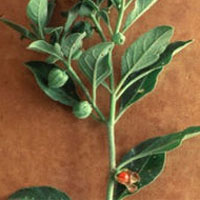Gluten Free
What does following a gluten-free diet mean? That you're embarking on an easy diet with a wide range of health-promoting effects. Instead of dwelling on what you’re giving up, consider that you’re going to enjoy a whole new world of delicious food options to meet your special dietary needs. You’ll be eating seasonally, choosing more fresh fruits and vegetables, focusing on meats, seafood, poultry, legumes, lentils, corn, and rice, and discovering fascinating ancient grains such as quinoa, amaranth, and millet. You’ll be able to eat potatoes, eggs, most cheeses, even chocolate (!)—and enjoy them without guilt because you’ll be taking good care of your body. In fact, you’ll probably end up eating—and feeling—better than ever!
Visit this page for more information about living Gluten Free
---
We carry a large variety of gluten free items, the brands listed below represent just some of the offerings we carry















More Diets
Ashwagandha
 © Steven Foster
© Steven FosterSide Effects
The safety of ashwagandha in pregnancy and lactation has been questioned in the popular literature and some other sources.10 These theoretical concerns appear to be based on ashwagandha’s alkaloid, specifically nicotine, content.11 Alkaloids, as a family, are known for their ability to affect the central nervous system and their potential to cause toxicity. Although ashwagandha’s adaptogenic effects are attributed to its steroidal lactones, known as withanolides, it contains numerous other constituents, including an array of alkaloids such as nicotine.12 These alkaloids are concentrated in the leaves, with only small amounts being present in the root, which is by far the most commonly used part of the plant. Alcohol extracts contain the highest amounts of alkaloids.13
In a study in rats, ashwagandha demonstrated no maternal or fetal toxicities, even at high doses.14 Its many historical uses include improving fertility, bringing on pregnancy, preventing miscarriage, and promoting lactation.15 Nonetheless, there are also reports of its use to induce abortion, although there is no information about the parts or doses used for this purpose.16
Given its long and broad history of use, the toxic potential of ashwagandha appears to be very low when used in typical amounts. Nevertheless, ashwagandha’s safety during pregnancy and lactation has not been rigorously studied and therefore cannot be confirmed.
Copyright © 2025 TraceGains, Inc. All rights reserved.
Learn more about TraceGains, the company.
The information presented by TraceGains is for informational purposes only. It is based on scientific studies (human, animal, or in vitro), clinical experience, or traditional usage as cited in each article. The results reported may not necessarily occur in all individuals. Self-treatment is not recommended for life-threatening conditions that require medical treatment under a doctor's care. For many of the conditions discussed, treatment with prescription or over the counter medication is also available. Consult your doctor, practitioner, and/or pharmacist for any health problem and before using any supplements or before making any changes in prescribed medications. Information expires December 2025.











